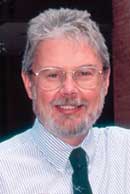From the Director
by Lee Allison,
Director and State Geologist

The KGS is pioneering key elements of the geoinformatics system through a variety of projects
The
first report of the State Energy Resources Coordination Council, issued
at the beginning of the legislative session in January, dropped a bombshell
in lawmakers’ laps. After nearly a century as one of the nation’s
leading energy exporters, Kansas is now a net energy importer, the Council
reported. Kansas’s net energy balance is expected to worsen for
the foreseeable future, with serious implications for the state’s
economic well being.
Fossil energy fueled the Kansas economy and provided substantial exports
to other states for much of the 20th century. About 20 years ago, the
state’s energy production and consumption were roughly in balance,
as oil, gas, and coal production declined; oil refineries were closed;
and increasing amounts of coal for electrical generation and gasoline
for transportation were imported. Since 1997, the net energy balance has
shifted strongly to the negative side. By 2007, we estimate that the state’s
net imports will be 650 trillion Btu a year, and Kansans could spend more
than $2.5 billion per year to import energy into the state.
Changing this trend will require extending the life of the state’s
oil and gas fields, increasing conservation and efficiency, and developing
new sources of energy, of which the most promising in the near term appear
to be ethanol, wind energy, and coalbed methane.
The KGS is engaged in a range of energy projects. For the past four years,
Survey scientists have been creating a virtual three-dimensional map of
the giant Hugoton natural gas field in southwest Kansas. The Hugoton field
has supplied gas to the Midwest for more than 80 years, but is now in
its last stage of productive life. The Survey is working with industry
to make a detailed subsurface analysis of the field, in hope of recovering
every possible cubic foot of gas.
Another Survey project seeks to demonstrate the use of waste carbon dioxide
(CO2) from an ethanol plant in Russell in enhanced oil recovery. Success
could lead to millions of barrels of oil being produced from the state’s
aging oil fields and extending their productive lives.
Another KGS team is assessing the potential for coalbed methane (natural
gas from coal seams) in eastern Kansas. Early drilling results by industry
are encouraging but limited. Rapid development of this resource could
significantly offset the loss of Hugoton production.
The KU Energy Research Center (ERC) is housed within the Survey and many
KGS staff members participate in ERC projects. The ERC hosts the Kansas
Energy Information Network web site (www.kansasenergy.org),
a clearinghouse for statewide energy news. The ERC is also gathering data
on Kansas wind energy and co-sponsored the annual wind energy conference
for the past three years.
In its first four months of operation, the state energy council produced an influential preliminary state energy plan, an energy abstract volume, and an online energy atlas, making them widely available via the internet. (Survey staff members, especially Liz Brosius and Scott White, were instrumental in compiling and analyzing the data in the council’s reports.) In the coming year, the council will develop strategies to reverse the state’s energy fortunes. The KGS will continue to play its dual roles of supporting the council’s activities and implementing projects to increase the state’s energy production.
![]()
Upcoming Events
Spring 2003
March 11, Water and the Future of Kansas 20th Annual Conference—The
Challenge of Abundant Clean Water, Manhattan, KS (http://www.dce.ksu.edu/dce/conf/waterfuture/).
March 23–24, Geological Society of America (GSA)
North Central Section, 37th Annual Meeting, Kansas City, MO (http://www.geosociety.org/sectdiv/Northc/03ncmtg.htm).
March 26–28, Great Plains Foundation 2003 Symposium—Air
and Water Resources in the Lives of People on the Great Plains—Past,
Present, and Future, Wichita, KS (http://www.greatplainsfoundation.org/).
April 11, Kansas Association of Conservation and Environmental
Education (KACEE) Spring Meeting, Garden City, KS (http://www.kacee.org).
April 25–27, Kansas Association of Teachers of
Science, KATS Kamp, Rocks Springs 4-H Center, Junction City, KS (http://kats.org/kamp/index.html).
May 3, Geology and Paleontology of Northwestern Kansas—KGS
Public Field Trip, Oakley, KS (http://www.kgs.ku.edu/Extension/fieldtrips.html).
May 11–14, American Association of Petroleum Geologists (AAPG), Annual Meeting—Energy, Our Monumental Task, Salt Lake City, UT (http://www.aapg.org/index.html).
Online February 10, 2003
Comments to: lbrosius@kgs.ku.edu
Kansas Geological Survey
URL:http://www.kgs.ku.edu/Publications/GeoRecord/2003/vol9.1/Page2.html